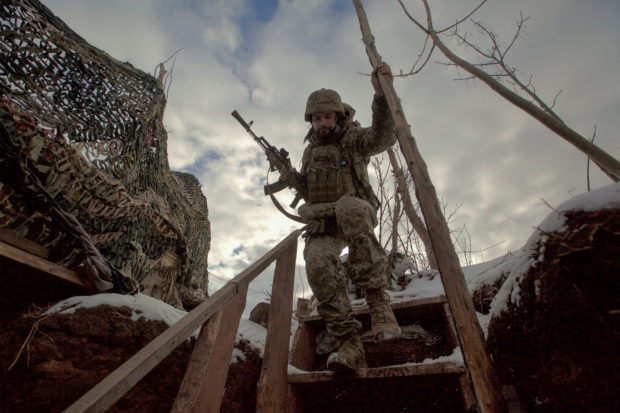Russia-Ukraine tensions: a long and troubled history

FILE PHOTO: A service member of the Ukrainian armed forces walks at combat positions near the line of separation from Russian-backed rebels near Horlivka in the Donetsk region, Ukraine, January 22, 2022. Picture taken January 22, 2022. Picture taken REUTERS/Anna Kudriavtseva/File Photo
KYIV — The threat of war between Russia and Ukraine has escalated, with Moscow’s army building up tanks, troops and artillery on the borders of the ex-Soviet nation.
The two neighbors have a long and complicated past, punctuated by friction and conflict.
Roots
Their shared history dates back a millennium to the Kievan Rus principality. That territory spanned over parts of what is now Russia, Ukraine and Belarus between the 9th and 13th centuries.
Moscow today sees it as the cradle of modern Russia.
In a 5,000-word essay entitled “On the historical unity of Russians and Ukrainians”, President Vladimir Putin argued that “Russians and Ukrainians were one people –- a single whole” who originated from “essentially the same historical and spiritual space”.
Article continues after this advertisementDuring his end-of-the-year news conference in December, Putin again raised eyebrows by saying Ukraine was “created” by Vladimir Lenin, the founder of the Soviet Union, in the 1920s, implying differences between the countries were artificial.
Article continues after this advertisementLanguage
After Ukraine gained independence following the collapse of the Soviet Union in 1991, Ukrainian, which belongs to the same East Slavic language family, was made the official state language.
Since then, Moscow has repeatedly accused Kyiv of working to “de-Russify” Ukraine by promoting the Ukrainian language. Kyiv says its aim is to undo the “Russification” dating back to the Russian Empire and the Soviet era.
A majority of the population is bilingual but considers Ukrainian their mother tongue. Russian is dominant in the south and east, including the regions held by pro-Moscow separatists since 2014.
Following the annexation of Crimea by Moscow in 2014, Russian has become less popular, and a law in 2019 made Ukrainian the dominant language in some sectors including trade.
Famine
The “Holodomor”, a famine which claimed the lives of millions of people in Ukraine in 1932-1933, is a major sticking point in Russian-Ukrainian ties.
Historians in Kyiv describe the events as a genocide orchestrated by then-Soviet leader Joseph Stalin to punish Ukrainians for opposing forced collectivization of agricultural land.
Under Putin, Russian authorities have sought to downplay Stalin-era repression. Moscow rejects Kyiv’s narrative, placing the events in the broader context of famines which devastated regions of Central Asia and Russia.
The east
Separatist-controlled Donbass in eastern Ukraine is a mining and industrial hub that is economically vital for Ukraine.
Fighting between government forces and Moscow-backed separatists erupted following the annexation of Crimea in 2014.
The region is at the heart of a cultural battle between Kyiv and Moscow since it is populated mainly by Russian speakers who the Kremlin says must be protected from Ukrainian nationalists.
Moscow’s critics in Ukraine say the region’s demographic make-up was altered by the famine and the movement of hundreds of thousands of Russian workers there after World War II.
Crimea
Moscow annexed the strategic Black Sea peninsula of Crimea after a popular uprising in Kyiv ousted a pro-Kremlin president in 2014.
Previously ruled by the Crimean Khanate, Crimea was annexed by the Russian Empire in the 18th century and played a key role during wars with the Ottoman Empire.
Communist party leader Nikita Khrushchev gave the peninsula to Soviet Ukraine in 1954 in what was then a largely symbolic move.
Crimea is also home to Crimean Tatars, a predominantly Muslim ethnic minority, who mostly opposed Russia’s annexation. Thousands of Crimean Tatars have fled the peninsula after coming under pressure from the Russian authorities.
Most countries do not recognize Russia’s takeover of Crimea, and Kyiv hopes that eventually the peninsula will become part of Ukraine again.
In 2018, Moscow built a bridge across the Kerch Strait to connect the peninsula to Russia.